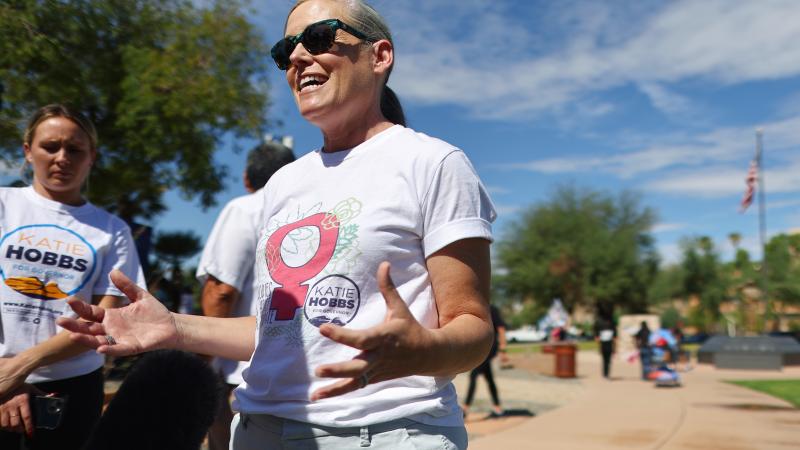Sanctuary state for child abuse? 'Gender affirming' shield bill approaches Dem governor's desk
Colorado Democrats nix provision to penalize parents in custody disputes for "deadnaming" or "misgendering" kids, but approved bill still prevents compliance with states that restrict blockers, hormones. Polis triangulates.
Colorado is no longer the first state that could strip parents of custody for calling their gender-confused children by their legal names, following a marathon overnight legislative committee hearing that approved HB 25-1312 without its "deadnaming" provision.
Term-limited Gov. Jared Polis, who is reportedly pursuing a "centrist approach" for the 2028 Democratic presidential nomination, may still prefer the slightly-less-pioneering transgender antidiscrimination bill die on the Senate floor Monday to protect his aspirations.
The House passed the intact bill on a party-line vote a month ago, shining a national spotlight on the Centennial State and prompting panicked supporters to question its sweep.
Advocacy group One Colorado changed its tune, upsetting some supporters and confusing bill sponsors, telling The Denver Post it worried the bill would jeopardize "existing protections" and be a magnet for lawsuits, citing "expert LGBTQIA+ lawyers."
Opponents packed Wednesday afternoon's state Senate Judiciary Committee hearing with an opponent-supporter ratio of nearly 10 to one on the list to testify, according to Denver Catholic. They included the Colorado Catholic Conference, which said the bill codifies discrimination against anyone "with a different belief about human sexuality" than the government's.
The bill passed early Thursday after lawmakers stripped the most controversial provision, to penalize a parent in custody disputes for deadnaming or "misgendering" a gender-confused child, but media reports differ on the details of other removals. (The bill page did not have the final version approved by the committee as of Sunday.)
A punching bag for SCOTUS again?
It's a whirlwind reversal for the bluest state in the Rockies, whose eagerness to punish Christians for running their businesses according to their understanding of biblical sexuality has repeatedly backfired on Colorado in court.
The Supreme Court has strengthened First Amendment precedents for at least creative practitioners such as baker Jack Phillips and website designer Lorie Smith, stemming from Colorado Human Rights Commission decisions against Phillips for refusal to make cakes celebrating same-sex unions and gender transitions.
SCOTUS this term will review another Colorado law that overrides parental authority, religious faith and free speech rights of therapists, a ban on so-called conversion therapy for minors questioning their sexuality or gender identity, which is law in about 20 states.
A split 10th U.S. Circuit Court of Appeals panel ruled against counselor Kaley Chiles last fall, claiming the law only "incidentally involves speech" and does not implicate a SCOTUS precedent against compelled speech for pro-life pregnancy centers.
The perceived persecution of Coloradans for wrongthink prompted personal intervention at least once by Polis, when a Colorado Springs charter school banned a student from wearing a purported slavery symbol, a Gadsden flag patch, on his backpack.
The school backed down after Polis called the Gadsden flag a "proud symbol of the American revolution" and the incident "a great teaching moment for a history lesson!”
The governor also touted his purported bona fides against bureaucracy last year by rescinding more than 200 "outdated and wasteful" executive orders, including his own, saying that keeping them on the books "may lead to confusion, inefficiency, or administrative burdens," though state Republicans said it wasn't enough.
Red states, meanwhile, are cementing their reputations as havens for gender-critical speech and parental rights and foes of blockers, hormones and surgery for gender-confused youth.
West Virginia Gov. Patrick Morrissey signed a ban on "gender altering medication" to minors that also "immediately" strips licenses of physicians who provide such medication or surgery and lets minor patients sue providers through their parents while underage or in their own name within 20 years of turning 18.
Montana Gov. Greg Gianforte signed a bill protecting public servants from compelled use of preferred gender pronouns.
Calling suicidal daughter by her legal name 'saved her from being a lifelong medical patient'
Colorado Democrats, who dominate the Legislature, have suppressed debate on gender identity for at least a year, and opponents accused them of doing it again last week by capping public comment on HB 25-1312 to four hours for each side.
The House majority removed a Republican lawmaker from the floor for refusing to use female pronouns and a non-legal name for the namesake of a transgender name-change bill, a male felon with two dozen convictions in Florida.
Gender-critical groups also sued several Democratic lawmakers for shutting down and chilling their members' speech at legislative hearings last year, even purging the "official audio record" of "significant portions" of one plaintiff's remarks.
The plaintiffs lost in district court and are now appealing to the 10th Circuit, challenging not only the legality of viewpoint discrimination in legislative hearings and immunity of lawmakers, but also the district court for forcing plaintiffs and their lawyers to "adhere to transgender ideology" in the legal proceedings themselves.
This winter, Democrats halted legislation to let young people who underwent puberty blockers, cross-sex hormones or surgical removal of healthy breasts and genitals before age 26 sue their providers for damages up to age 38. Prominent detransitioners met with Education Secretary Linda McMahon weeks later.
The backlash to HB 25-1312 gave Democrats their first sense of going too far.
Colorado Springs District 11 Board Secretary Jason Jorgenson said before the Senate committee vote that saying "one wrong thing at home" or seeking counseling that explores without affirming gender confusion could endanger parents, KKTV reported.
Erin Lee testified her 12-year-old daughter attempted suicide after her school secretly "coached" the girl on how to see a gender-affirming therapist and get a "care letter" for blockers and hormones, Denver Catholic reported. Now a healthy 16-year-old, calling the girl by her birth name "saved her from being a lifelong medical patient."
While senators removed the bill's "coercive control" clause on favoring parents who affirm gender confusion in custody disputes, opponents object to remaining provisions, including a shield against compliance with other states' laws removing a child from the custody of a parent or guardian giving them blockers or hormones.
Approved amendments, which are often difficult to understand because they refer to lines rather than bill subjects, do make clear that "persistent" deadnaming or misgendering "while on notice" of an individual's preference is "evidence" of discrimination, though public entities, employers and housing providers can use legal names to verify identities.
The legislation "still poses a serious threat to parents and children" by forcing schools to identify students by gender-affirming names and including fields for both legal and chosen names on all public documents, in addition to refusing to enforce other states' laws, Southeastern Legal Foundation Executive Director Kim Hermann said.
Polis is positioning himself in the middle, with a spokesperson telling the Post the governor's office shared "a number of legal and policy concerns" with sponsors and that he believes "further conversations are needed," especially so the bill "better takes into account the complexity of family law and family dynamics."
The Facts Inside Our Reporter's Notebook
Videos
Links
- HB 25-1312
- reportedly pursuing a "centrist approach"
- The Denver Post
- Denver Catholic
- baker Jack Phillips
- website designer Lorie Smith
- SCOTUS this term will review another Colorado law
- 10th U.S. Circuit Court of Appeals panel ruled against
- Polis called the Gadsden flag
- rescinding more than 200 "outdated and wasteful" executive orders
- West Virginia Gov. Patrick Morrissey signed
- protecting public servants from compelled use
- removed a Republican lawmaker
- shutting down and chilling their members' speech at legislative hearings
- appealing to the 10th Circuit
- Democrats halted legislation to let young people
- Prominent detransitioners met
- KKTV reported
- "persistent" deadnaming or misgendering "while on notice"















